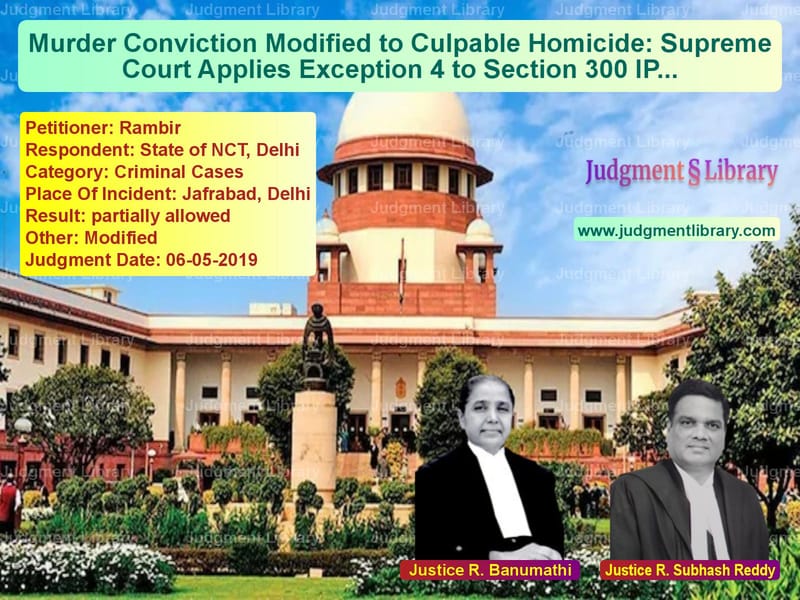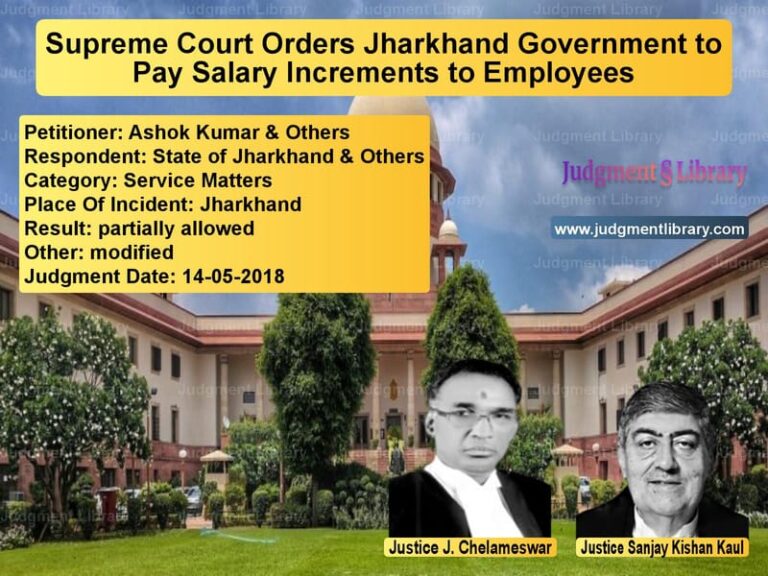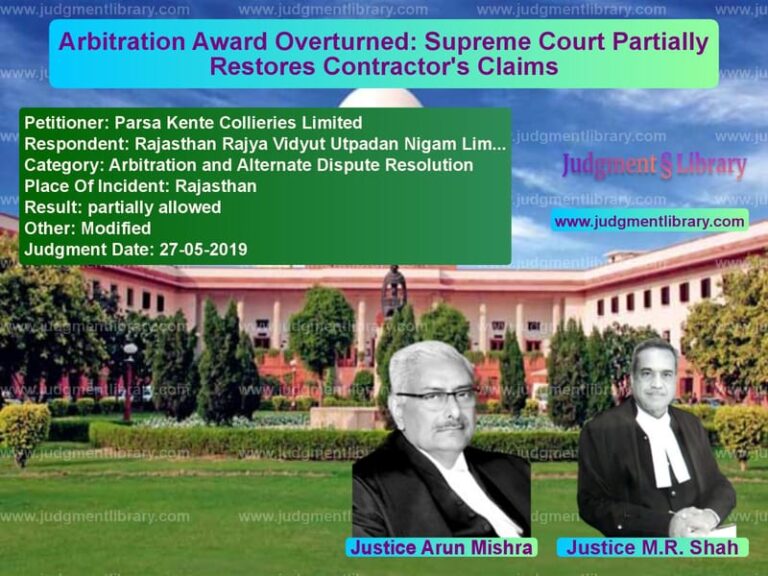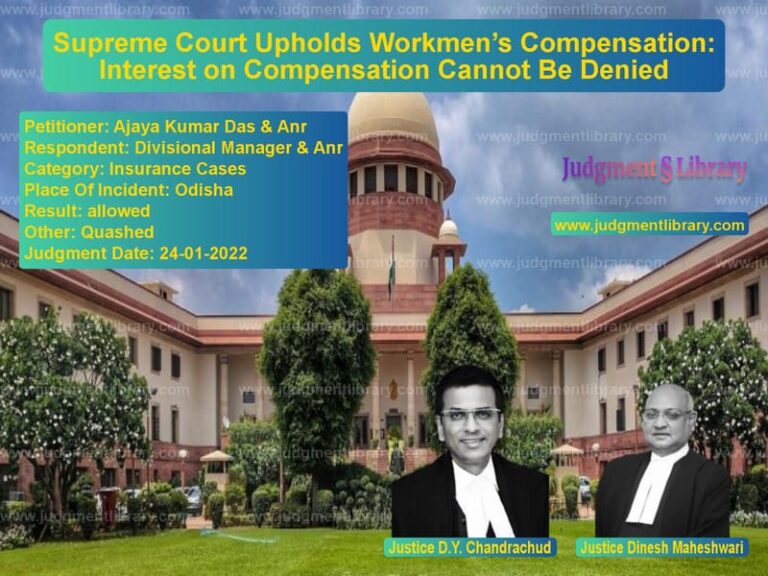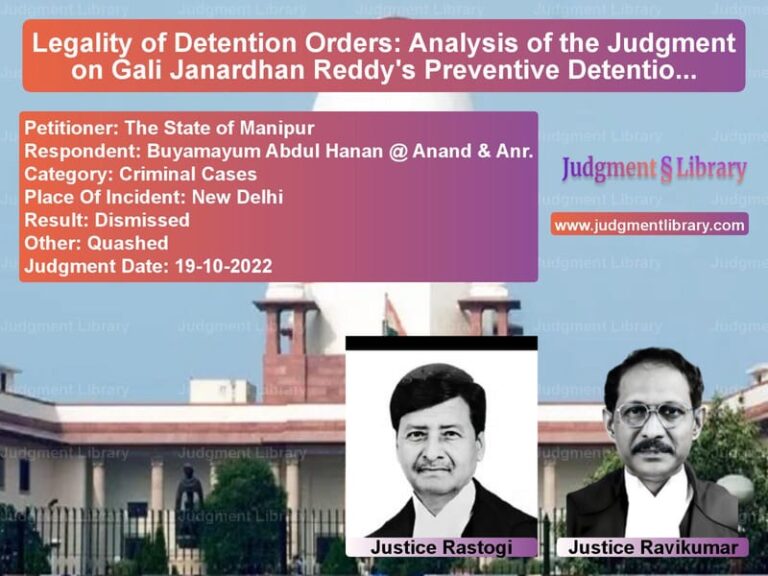Murder Conviction Modified to Culpable Homicide: Supreme Court Applies Exception 4 to Section 300 IPC
The Supreme Court of India recently ruled in the case of Rambir vs. State of NCT, Delhi, where the appellant was convicted under Section 302 of the Indian Penal Code (IPC) for the murder of his wife. The case revolved around the legal principle of whether the crime qualified as murder or culpable homicide not amounting to murder under Exception 4 to Section 300 IPC. The Court found that the killing occurred in a sudden quarrel, reducing the conviction to culpable homicide not amounting to murder under Section 304 Part II IPC.
The ruling is significant as it clarifies the application of Exception 4 to Section 300 IPC, which provides that an act committed in a sudden fight, without premeditation, and in the heat of passion may not qualify as murder.
Background of the Case
The prosecution alleged that on the night of August 31, 2010, the appellant, Rambir, strangled his wife, Sua, to death on the rooftop of their residence at C-834, Gali No.30/3, Jafrabad, Delhi. The prosecution charged the appellant under Sections 302 and 34 IPC, and the Additional Sessions Judge convicted him, sentencing him to life imprisonment.
The appellant challenged the conviction in the Delhi High Court, arguing that the incident occurred in a sudden quarrel without premeditation. However, the High Court dismissed the appeal and upheld the life sentence.
Subsequently, the appellant approached the Supreme Court, which issued notice limited to the nature of punishment and quantum of sentence.
Key Legal Issues
The Supreme Court examined two crucial questions:
- Did the case qualify as murder under Section 302 IPC, or did it fall under Exception 4 to Section 300 IPC?
- Should the appellant’s sentence be modified in light of the facts of the case?
Arguments by the Appellant (Rambir)
The defense counsel argued the following points:
- The incident occurred in the heat of the moment after a quarrel between the appellant and his wife.
- The appellant was under the influence of alcohol and lost his temper when the deceased tried to forcibly take money from his pocket.
- The strangulation was not premeditated; it was an act of sudden anger, qualifying for Exception 4 to Section 300 IPC.
- The punishment should be reduced as the act did not amount to murder but culpable homicide not amounting to murder.
Arguments by the Respondent (State of NCT, Delhi)
The prosecution opposed the appeal, arguing:
- The appellant’s act of picking up an iron rod (‘saria’) and forcefully pressing his wife’s neck showed extreme cruelty.
- The manner in which the crime was committed indicated an intention to cause death.
- Since there was no sudden provocation from the victim, Exception 4 to Section 300 IPC should not apply.
- The trial court and the High Court correctly held that the crime amounted to murder under Section 302 IPC.
Supreme Court’s Key Observations
The Supreme Court analyzed the case facts and applied the legal principles of Exception 4 to Section 300 IPC. It made the following key observations:
1. The Killing Occurred in a Sudden Quarrel
- The appellant did not pre-plan the attack; the incident happened after an argument.
- Evidence showed that the quarrel escalated when the deceased attempted to take money from the appellant’s pocket.
- There was no evidence of prior hostility or enmity between the appellant and the deceased.
2. No Premeditation in the Crime
- The Court found that the appellant did not bring the ‘saria’ to the scene but picked it up in the heat of the moment.
- The act of strangulation occurred due to a sudden surge of anger and not as part of a pre-planned murder.
3. The Act Was Done in the Heat of Passion
- The appellant was intoxicated at the time, which affected his ability to control his emotions.
- The sudden altercation and the presence of alcohol led to an impulsive rather than intentional killing.
4. The Act Did Not Involve Extreme Cruelty
- The High Court had denied the benefit of Exception 4, stating that the appellant’s act was excessively cruel.
- However, the Supreme Court disagreed, stating that while the act was violent, it did not reach the level of ‘extreme cruelty’ required to disqualify the case from Exception 4.
Final Judgment
The Supreme Court ruled as follows:
- The conviction under Section 302 IPC was set aside.
- The offense was modified to culpable homicide not amounting to murder under Section 304 Part II IPC.
- The appellant was sentenced to 10 years of simple imprisonment.
Implications of the Judgment
This ruling has significant implications for criminal law:
1. Clarification on Exception 4 to Section 300 IPC
- The judgment reaffirms that an unintentional killing during a sudden quarrel can be classified under Exception 4.
- It clarifies that strangulation, unless exceptionally brutal, does not automatically amount to murder.
2. Recognition of Human Emotions in Criminal Law
- The Court acknowledged that crimes committed in a moment of rage should not always be classified as murder.
- The ruling highlights the importance of considering the mental state and provocation in sentencing.
3. Precedent for Future Cases
- The ruling provides a clear precedent for lower courts on when Exception 4 can apply.
- It ensures that not all domestic quarrel-related deaths are treated as premeditated murder.
Conclusion
The Supreme Court’s ruling in Rambir vs. State of NCT, Delhi is a landmark judgment that reaffirms the distinction between murder and culpable homicide not amounting to murder. By applying Exception 4 to Section 300 IPC, the Court acknowledged the role of sudden provocation and lack of premeditation in determining criminal liability.
This judgment provides clarity on how courts should approach cases involving domestic disputes that escalate into violence. It ensures that sentencing in such cases is fair and proportionate, balancing justice with an understanding of human emotions and impulsive actions.
Petitioner Name: Rambir.Respondent Name: State of NCT, Delhi.Judgment By: Justice R. Banumathi, Justice R. Subhash Reddy.Place Of Incident: Jafrabad, Delhi.Judgment Date: 06-05-2019.
Don’t miss out on the full details! Download the complete judgment in PDF format below and gain valuable insights instantly!
Download Judgment: Rambir vs State of NCT, Delhi Supreme Court of India Judgment Dated 06-05-2019.pdf
Direct Downlaod Judgment: Direct downlaod this Judgment
See all petitions in Murder Cases
See all petitions in Bail and Anticipatory Bail
See all petitions in Fraud and Forgery
See all petitions in Judgment by R. Banumathi
See all petitions in Judgment by R. Subhash Reddy
See all petitions in partially allowed
See all petitions in Modified
See all petitions in supreme court of India judgments May 2019
See all petitions in 2019 judgments
See all posts in Criminal Cases Category
See all allowed petitions in Criminal Cases Category
See all Dismissed petitions in Criminal Cases Category
See all partially allowed petitions in Criminal Cases Category

